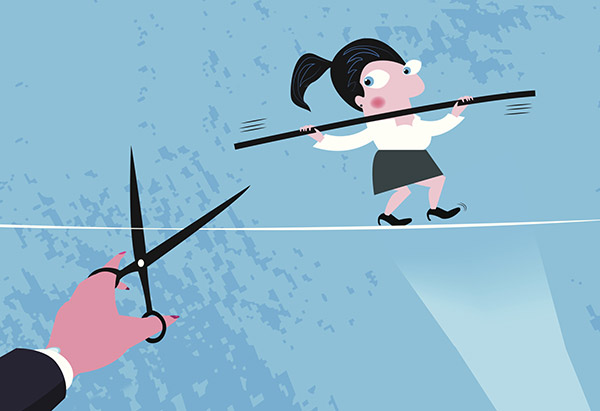How to Bounce Back from Rejection
It only takes a minute to start your rebound.

Illustration: Thinkstock
If you have a minute...focus on the right face.
We all know the best thing to do when we're down: Talk, laugh (or bawl) it out with the person we love most. But until that happens, just looking at a photo of this person can activate natural painkillers in the brain, along with oxytocin and serotonin, both of which are associated with trust, well-being and calmness. Compared with viewing a headshot of a mere acquaintance, this exercise can relieve moderate pain by about 40 percent, found neuroscientists at Stanford University.
If you have 15 minutes...pick up a pen.
In an increasingly popular technique called self-affirmation, you write two paragraphs about the one thing that you value the most about yourself (your originality, spiritual or political values, anything) and explain why it matters in your life and how it shows up in what you do. When volunteers at Canada's University of Victoria wrote out these explanations, they became more rejection-resistant for at least eight weeks. Why? By crystallizing who they were and the resources they had, their emotional core remained intact...so they stopped broadcasting anxious and avoidant vibes. Which reduced their chances of getting rejected in the first place.
...And if you have five extra minutes, describe your kitty or BFF, too.
Because when volunteers (primed to feel snubbed) at Miami University had five minutes to explain on paper what they adored about their cat, dog or best buddy, their self-esteem bounced right back, unlike the control group. (Option: write about your closest friend, which has been shown to be equally effective in recovery.) Though some might argue that the distinction between the two subjects—pet and pals—is nonexistent.
Next: The thing that can compensate for the "coldness" of rejection
If you have 30 minutes...slip into something hot.
Hot water can compensate for the "coldness" of rejection, claims John Bargh, PhD, a social psychologist at Yale University. His research found that people who felt lonely took baths and showers that were hotter and longer than those who felt accepted. If they warmed up their hands by holding a thermal pack, they felt less need for someone to comfort them. One theory, Bargh explains, is that we conflate physical and emotional warmth because both are processed in a plum-sized region of the brain called the insular cortex. Which also reveals why, when given the "cold-shoulder," we might actually shiver.
If you have four hours...take a "happy" pill.
Another surprise: From your brain's perspective, the pain of a rebuff isn't much different from a kick in the duff. Which explains how one of the most common painkillers in the world—acetaminophen—could relieve hurt feelings among volunteers in a study at the University of Kentucky. (Sure, they knew they'd been turned down or excluded; it just didn't upset them as much as it did the control group.) As further proof, brain scans showed reduced activity in regions associated with emotional pain. Their dose: 500 mg twice daily; the drug has a half-life of about four hours. (Warning: Long-term use of acetaminophen causes liver damage and other serious complications.)
If you have one week...master a game-changer.
After being shot down once or twice, we might start to see rejection everywhere (the boss grunts instead of greets, a friend is late for coffee). To combat this cycle, Marc Baldwin, PhD, a psychology professor at McGill University, developed Psych Me Up!, a free app. Drawing on cognitive bias modification (CBM) techniques, the game trains you to ignore social threats (frowning faces) while seeking out positive (smiling) ones—which may reduce the knee-jerk expectation that you'll get rejected again. After a week of smile-hunting every morning before work, telemarketers felt more confident and coped better than a control group that played neutral games, Baldwin reports. Further proof: Their stress hormone levels were 17 percent lower.
Over a lifetime...make lemonade.
Or at least brainstorm for fresh solutions, concluded a study at Johns Hopkins University in which people generated more creative ideas (e.g., unusual word associations and far-out renderings of creatures from other plants) after having been rejected instead (provided they valued personal over group goals). "Rejection may amplify feelings of distinctiveness and the willingness to recruit ideas from unusual places," the study explained. Which means that if your plan A is shot down, you'd come up with an even better plan B; if not, then onward to a yet more remarkable plan C. Which is how a bounce-back can actually make us better off.
More on Empowering Yourself



